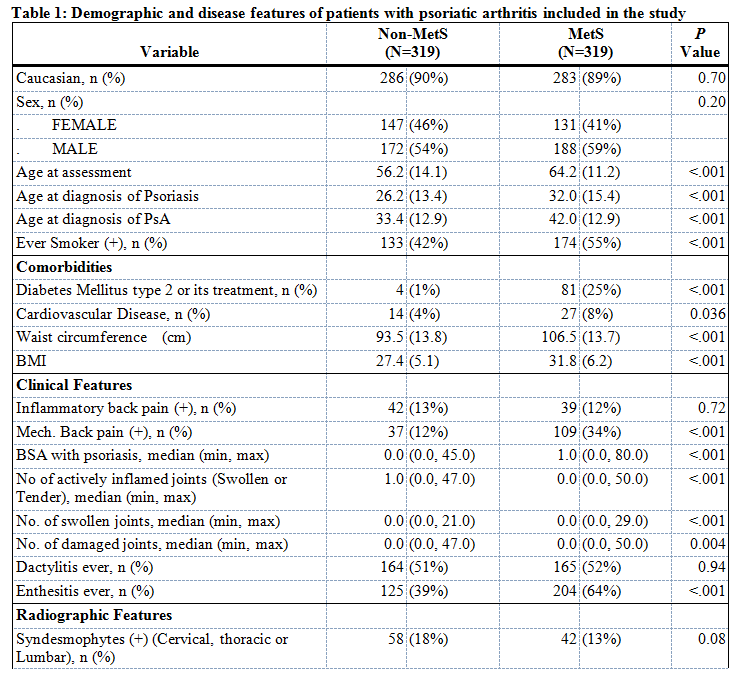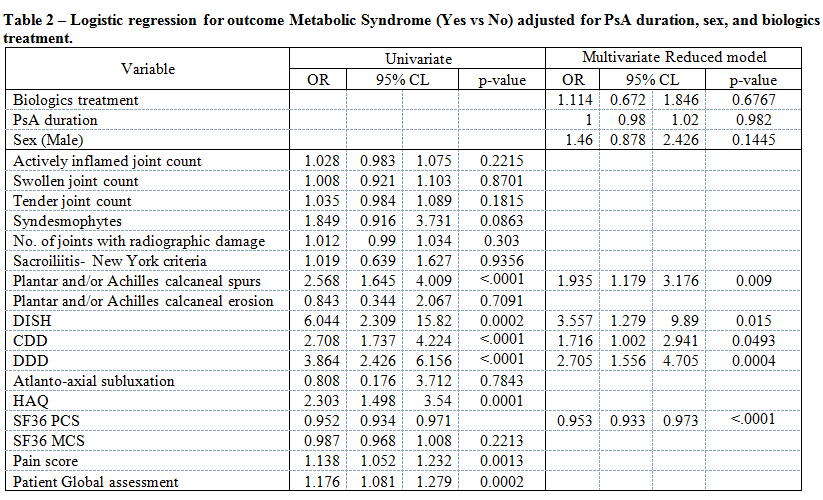Session Information
Session Type: Poster Session (Tuesday)
Session Time: 9:00AM-11:00AM
Background/Purpose: Psoriatic Arthritis (PsA) is associated with a higher prevalence of metabolic syndrome (MetS). MetS itself is also associated with a state of chronic, low-grade inflammation. With the hypothesis that MetS is associated with radiographic damage in patients with PsA, we aimed to determine the association between MetS and axial as well as peripheral radiographic abnormalities in PsA.
Methods: Data on clinical (including MetS) and radiographic features were obtained from a large PsA cohort. Patients were classified as having MetS at the last clinic visit if they satisfied the harmonized definition of MetS by Albert KG et al (1). Demographic, clinical and radiographic data were compared between groups using t-test, Wilcoxon test or chi square test as appropriate. Regression methods were used to adjust for differences in age, sex or PsA duration and treatment, as appropriate. We used multivariable logistic regression to identify features independently associated with MetS in PsA patients.
Results: 319 PsA patients with MetS were compared to 319 patients without MetS (Table 1). Patients with MetS were older at assessment, and had an older age at onset of psoriasis and PsA. As expected, they had a higher waist circumference, BMI, diabetes and cardiovascular comorbidities. Patients with MetS were also more likely to be treated with conventional DMARDs and biologics indicating more severe disease. Patients with MetS were more likely to have calcaneal spurs, DISH, cervical and lumbar degenerative disc disease, after accounting for sex, PsA duration and biologic therapy. There were no differences in the presence of sacroiliitis (NY criteria) or radiographic damage to peripheral joints. Patients with MetS also reported a higher HAQ, pain score and global disease activity score. Multivariate regression analyses identified calcaneal spurs, DISH, cervical and lumbar degenerative disc disease as features independently associated with MetS in patients with PsA.
Conclusion: PsA patients with MetS present at an older age, have higher prevalence of comorbidities and more severe disease when treatment and patient reported outcomes are considered. MetS is not associated with radiographic severity of PsA but is associated with osteoarthritic and metabolic changes in the spine and enthuses.
To cite this abstract in AMA style:
Tunc S, Ye J, Gladman D, Chandran V. The Association Between Metabolic Syndrome and Radiographic Damage in Psoriatic Arthritis [abstract]. Arthritis Rheumatol. 2019; 71 (suppl 10). https://acrabstracts.org/abstract/the-association-between-metabolic-syndrome-and-radiographic-damage-in-psoriatic-arthritis/. Accessed .« Back to 2019 ACR/ARP Annual Meeting
ACR Meeting Abstracts - https://acrabstracts.org/abstract/the-association-between-metabolic-syndrome-and-radiographic-damage-in-psoriatic-arthritis/


